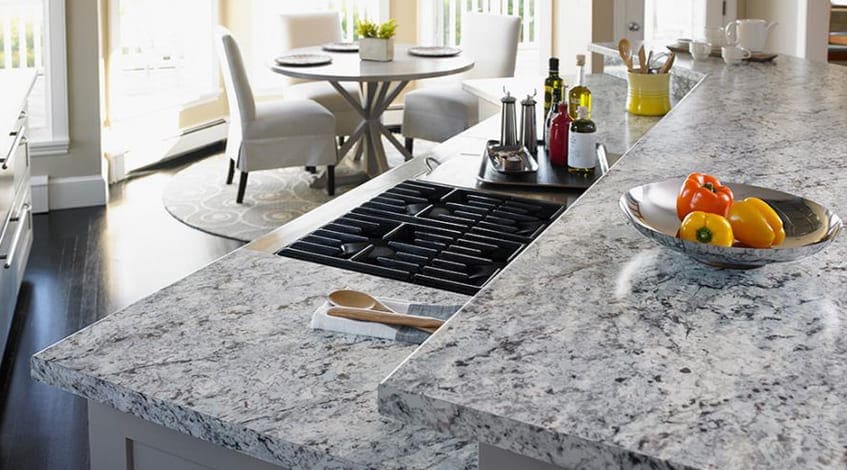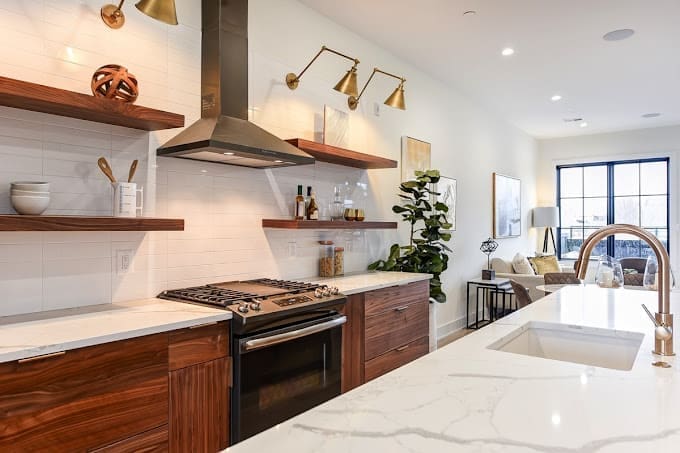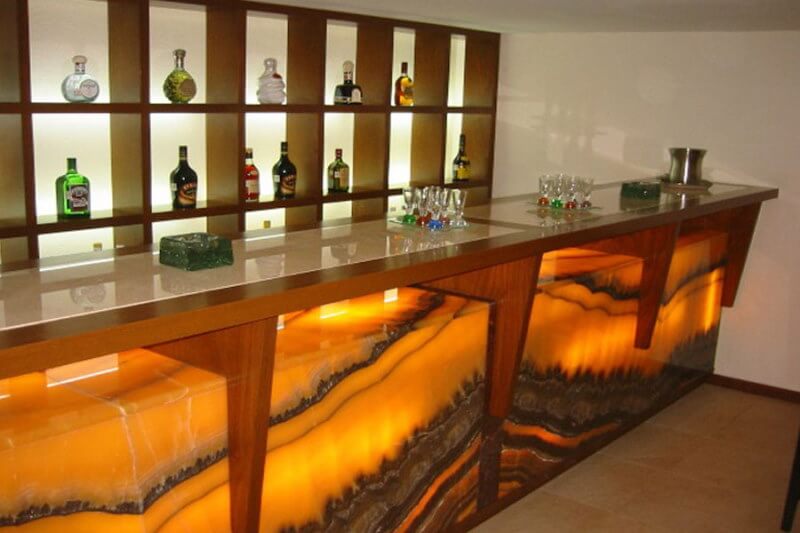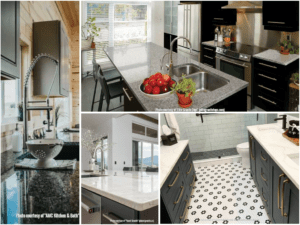Example of 2 cm and 3 cm Thick Stone Countertops. Image Generated by AI.
Introduction
Hey there, friends! I’m Dan, a home renovation specialist, and as you might remember, my wife and I recently decided to give our kitchen a makeover. Along the way, we faced a big decision—what countertop thickness should we go with? It turned out to be more complicated than we expected, so I wanted to share my experience to help make your choice easier.
In this article, I’ll break down the differences between 0.787-inch and 1.181-inch countertops, their pros and cons, and how thickness impacts both the style and functionality of your kitchen. I’ll also share practical tips on choosing the right option based on budget, durability, and design preferences. If you’re in the process of picking new countertops, I hope my insights help you make a confident and informed decision!
1. Standard thickness of kitchen countertops.
When my wife and I started looking for a kitchen countertop, I had no idea that thickness played such a crucial role. It turns out that 0.787 inch and 1.181 inch aren’t just common sizes—they've become industry standards. But why these specific measurements?
The answer goes back to the 1970s and 1980s when kitchen design underwent a transformation. As kitchens became the focal point of homes, designers and engineers recognized the need for countertops that were both durable and visually appealing. Over time, two preferred thicknesses emerged: 0.787 inch for a sleeker, more budget-friendly option, and 1.181 inch for added durability and a more substantial look. Thanks to architects, designers, and manufacturers, these dimensions became the go-to choices and have remained popular ever since.

A 6 cm thick natural stone countertop. Photo sourced from the stock photo site Pexels.
2. Comparing 0.787-Inch and 1.181-Inch Countertops: Which Thickness Is Best for Your Kitchen?

 Stone countertops in various thicknesses. Photo courtesy of “American Quartz & Granite” (americanquartzgranite.com) and “Pyramid Granite” (pyramidgranite.us)
Stone countertops in various thicknesses. Photo courtesy of “American Quartz & Granite” (americanquartzgranite.com) and “Pyramid Granite” (pyramidgranite.us)
When selecting a countertop for our kitchen, we wanted to understand how thickness affects aesthetics, durability, installation, and cost. To make the decision easier, I put together a comparison table highlighting the key differences between 0.787-inch and 1.181-inch countertops.
|
Criterion
|
0.787 inch
|
1.181 inch |
|
Appearance and Style
|
Lightweight and elegant, ideal for minimalist and modern interiors
|
More substantial and solid, ideal for classic and industrial-style kitchens
|
|
Durability and Longevity
|
Less resistant to damage and may require additional support
|
Offers superior strength and durability, with high resistance to damage and wear
|
|
Mounting and Installation Methods
|
Easier to install but needs extra reinforcement for stability
|
Requires more effort to install but ensures greater stability and support
|
|
Cost and Budget
|
More budget-friendly, with lower costs for both materials and installation
|
Higher in cost, but delivers enhanced longevity and structural reliability
|
If your priority is stylish minimalism, budget-friendliness, and easy installation, a 0.787-inch countertop is an excellent choice. However, if durability, longevity, and a classic look matter more to you, a 1.181-inch countertop would be the better option. Both have their advantages, and the best choice depends on your preferences and kitchen space requirements.
3. But what if you decide to go with a 1.574-inch countertop?
What Are 1.574-Inch Countertops? 1.574-inch countertops can be crafted from solid stone, providing exceptional durability and strength—though at a higher cost. A more affordable alternative is a laminated design, where two 0.787-inch slabs are seamlessly bonded together.
Appearance & Style. A 1.574-inch countertop creates a sense of luxury and grandeur. It pairs well with classic or industrial interiors and is particularly striking in larger kitchens.
Durability and Longevity
Solid 1.574-inch countertops are incredibly durable and long-lasting. However, laminated versions may not be as sturdy, so it's essential to consider this when making your choice.
Cost and Accessibility. 1.574-inch countertops are a premium option and come at a higher price. However, if you're aiming for an upscale, high-end kitchen, the investment is well worth it.
For example, according to The First National Ranking of Stone Countertop Fabricators and Installers, which conducts pricing research on countertops across different cities, I found that the minimum cost of a quartz countertop like Calacatta Idilio or Carrara Morro starts at $3,096, while the maximum price reaches $16,993 for Calacatta Idilio and $16,950 for Carrara Morro. To find out how much a Calacatta Idilio or Carrara Morro countertop (with a square footage of 83.4 sq. ft. and a 4-inch backsplash) would cost from contractors in your city, check the “Average Cost” section.
4. Thickness of Countertops Made from Different Materials
When choosing a kitchen countertop, it's important to consider not only the thickness but also the material. Each material has its own characteristics that impact durability, appearance, and cost. The table below provides a comparison of the typical thicknesses for the most popular countertop materials.
|
Material
|
0.787 inch Thickness
|
1.181 inch Thickness
|
1.574 inch Thickness
|
|
Granite
|
Requires additional support for installation. Less durable but a budget-friendly option
|
Standard thickness for granite, suitable for most kitchens
|
Rarely found, adds a luxurious look to the kitchen, but is a costly option.
|
|
Marble
|
Needs a substrate for extra support. More prone to damage but offers an elegant look.
|
Standard for marble, strong and durable, ideal for busy kitchens
|
A 1.574-inch marble countertop looks elegant and substantial but may be less resistant to damage.
|
|
Quartz
|
A lightweight and affordable option, but requires additional reinforcement
|
Standard thickness for quartz, offering greater strength and longevity
|
Rarely used, usually a laminated version made from two 0.787-inch slabs. Higher in cost.
|
|
Quartzite
|
Very rarely used, as the material is strong and heavy.
|
Typically 1.181 inch, a sturdy material that works well for kitchen use.
|
Very expensive and difficult to fabricate, visually striking but requires additional installation support.
|
When choosing the thickness of your countertop, it’s important to consider not only aesthetic preferences but also the characteristics of the material. If you’d like to learn more about different types of natural stone, I recommend reading the article “10 Types of Natural Stone Countertops: Unveiling Top Picks for Your Kitchen.” This article will help you better understand natural stone options for countertops and explore alternatives to natural stone.
5. Reviews from Professionals and Homeowners.
To give you a more comprehensive understanding of the differences between 0.787-inch and 1.181-inch countertops, I decided to share insights from those who know best—real user reviews from Reddit.
euca-lyptus posted:
There are 2 “standard” thicknesses of stone. 2cm (3/4”) and 3cm (1 1/4”). You could definitely get a drop edge added to the counter to make it look thicker. Usually around the sink and next to the stove/fridge will show the thinner part of the stone. It could be that the color is only available in the 2cm thickness so you might have to look at different colors. Countertops are expensive, get what you want and don’t settle because you might regret it after it is too late. I’ve installed both 2cm and 3cm countertops and definitely prefer the 3cm look.
dano___ posted:
Stone comes in 2cm or 3cm, both are widely used in different markets.
It’s very common to use 2cm and add on a mitred edge, especially if you want a finished look of 40mm (1-1/2”). If done well the glue joint is invisible on quartz, but you generally wouldn’t do more than an 1/8” round on the edge. Doing larger rounds would require a sandwiched edge, but both rounded edges and sandwiched profiles are going to look somewhat dated.
In my area the standard is to use a 40mm mitre on 2cm material, this will fit your kitchen well and should give you no issues for installation or long term durability.
As you can see, opinions on countertop thickness can vary. It all depends on your preferences, kitchen style, and even the material you prefer. It’s important to understand that every choice has its pros and cons, and what works for one person may not be the best option for another.
6. How Does Countertop Thickness Impact the Style and Functionality of Your Kitchen?
When we started our kitchen renovation, I knew—having been passionate about design for years—that every detail plays a crucial role in shaping the overall aesthetic of the space. One of those key details was the countertop, which is not only functional but also sets the tone for the entire kitchen. Faced with the choice between a 0.787-inch and a 1.181-inch thickness, I quickly realized that this decision would have a significant impact on the kitchen’s overall style.
Modern Thin Countertops (0.787 inch)
Thin countertops, measuring 0.787 inch in thickness, are perfect for modern and minimalist kitchens. They don’t overwhelm the space; instead, they add a sense of lightness and elegance. This is especially important if you have a smaller kitchen or want to create an open and airy feel. This option is ideal for those looking to incorporate a sleek, contemporary touch. Thin countertops give the kitchen a stylish and sophisticated look that is highly popular in interior design today. They create a clean, simple, yet elegant aesthetic that enhances the overall space.
Classic and Substantial Countertops (1.181 inch)
Countertops with a 1.181-inch thickness create a more substantial and solid appearance. They are an excellent option for those looking to enhance their kitchen with both style and a sense of durability and stability. The 1.181-inch thickness adds an elegant and timeless touch, making it a perfect fit for classic kitchen designs. These countertops work particularly well in larger kitchens, where their bold presence can complement the space without overwhelming it.
If you have a larger, more spacious kitchen, a 1.181-inch countertop will serve as a solid, well-integrated element within the overall design. This thickness not only adds functionality but can also become a striking focal point that draws attention. The substantial look of this option pairs perfectly with classic or industrial-style kitchens, where emphasis on durability and status is key.
When planning my own kitchen, I quickly realized that if we had more space, I would have chosen the 1.181-inch option without hesitation.
Conclusion
When choosing the thickness of your countertop, it's essential to consider your kitchen’s style, budget, and functionality. If you prefer a modern and lightweight look, a 0.787-inch countertop is an excellent choice. For a more classic and durable option, a 1.181-inch thickness works best. And if you want a luxurious and long-lasting statement piece, a 1.574-inch countertop is the way to go. The key is to select the option that fits seamlessly into your kitchen and meets your specific needs.
I hope this information helps you make the right decision! Now that you've chosen the ideal thickness, the next crucial step is finding a reliable contractor for installation. This is just as important as selecting the countertop itself. You can find the best professionals in The First National Ranking of Stone Countertop Fabricators and Installers in the U.S.
Good luck with your selection, and enjoy your kitchen upgrade!














